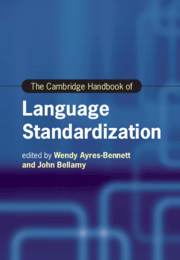Book contents
- The Cambridge Handbook of Language Standardization
- cambridge handbooks in language and linguistics
- The Cambridge Handbook of Language Standardization
- Copyright page
- Contents
- Figures
- Tables
- Contributors
- Introduction
- Part I Revisiting Models and Theories of Language Standardization
- Part II Legitimacy, Authority and the Written Form
- 7 Standard Languages in the Context of Language Policy and Planning and Language Rights
- 8 State-Appointed Institutions
- 9 Grammars, Dictionaries and Other Metalinguistic Texts in the Context of Language Standardization
- 10 An Industry Perspective
- 11 The Role of Literature in Language Standardization
- 12 Standardization, New Speakers and the Acceptance of (New) Standards
- 13 Creoles and Variation
- Part III Norms, Literacy and Education
- Part IV Beyond the National
- Part V Standardization in Late Modernity
- Name Index
- Subject Index
- References
8 - State-Appointed Institutions
Authority and Legitimacy in the Spanish-Speaking World
from Part II - Legitimacy, Authority and the Written Form
Published online by Cambridge University Press: 01 July 2021
- The Cambridge Handbook of Language Standardization
- cambridge handbooks in language and linguistics
- The Cambridge Handbook of Language Standardization
- Copyright page
- Contents
- Figures
- Tables
- Contributors
- Introduction
- Part I Revisiting Models and Theories of Language Standardization
- Part II Legitimacy, Authority and the Written Form
- 7 Standard Languages in the Context of Language Policy and Planning and Language Rights
- 8 State-Appointed Institutions
- 9 Grammars, Dictionaries and Other Metalinguistic Texts in the Context of Language Standardization
- 10 An Industry Perspective
- 11 The Role of Literature in Language Standardization
- 12 Standardization, New Speakers and the Acceptance of (New) Standards
- 13 Creoles and Variation
- Part III Norms, Literacy and Education
- Part IV Beyond the National
- Part V Standardization in Late Modernity
- Name Index
- Subject Index
- References
Summary
In contemporary societies, policy and planning initiatives driven by state-appointed institutions seek to manage and promote specific, prestigious, standardized varieties of language. Within the framework of language ideologies and standardization, this chapter analyses academies and similar organizations charged with promoting the Spanish language and seeks to identify contemporary patterns of normativity, with a particular focus on the Real Academia Española (Royal Spanish Language Academy, or RAE). The evolving nature of contemporary media, particularly social media, requires scholarship to address how these outputs constitute a form of status planning and how the interface between the digital world and language standardization works. Building on previous work on ‘Standard’ or ‘Panhispanic’ Spanish, I consider how the RAE has embraced and harnessed technological advances and explore how these latest changes are employed as a way of promoting Spanish globally. A wider discussion on the role of academies as ‘language mavens’ and ‘verbal hygienists’ follows. By critiquing the missions, activities, publications and practices carried out in these state-appointed institutions, we can understand how language management goals are achieved and how digital discourse disseminates, legitimates and reinforces the authority of both the institutions and also the state that appoints them.
- Type
- Chapter
- Information
- The Cambridge Handbook of Language Standardization , pp. 234 - 262Publisher: Cambridge University PressPrint publication year: 2021

